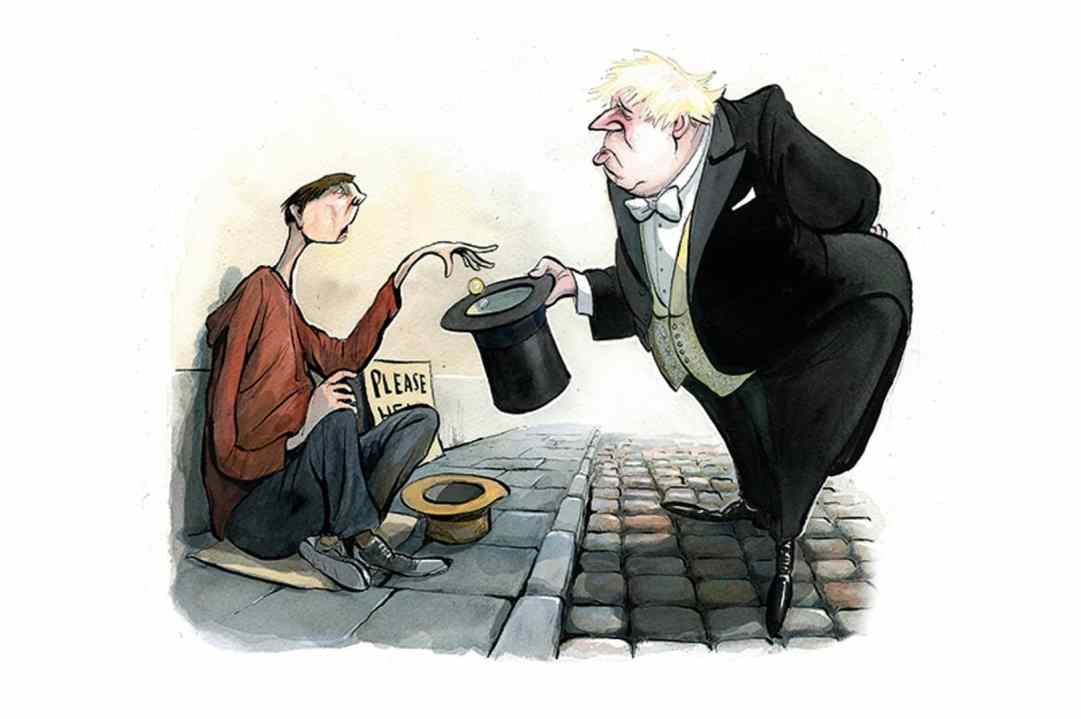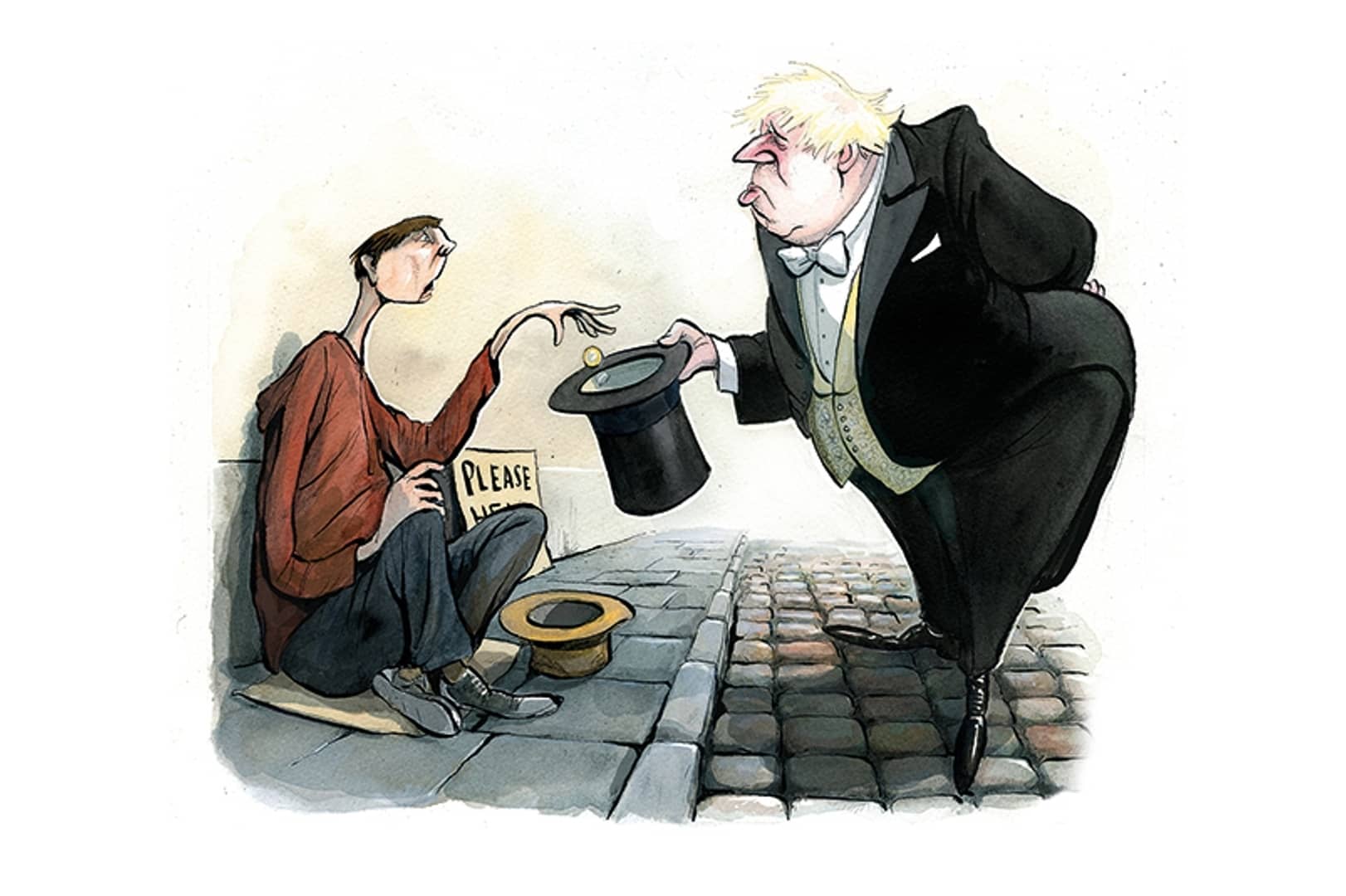Boris Johnson’s speech in Blackpool today prompted much dry commentary from the assembled press pack. With its talk of low taxes and prudent government, it’s no surprise that many of the journalists were left asking ‘Who’s the new guy?’ and ‘If only he had been Prime Minister these past two years.’ Johnson talked a good game, as usual, telling his audience that:
The overall burden of taxation is now very high – and sooner or later, and I would much rather it was sooner than later, that burden must come down. The answer is economic growth. You can’t spend your way out of inflation, and you can’t tax your way into growth.
Sound stuff of course but we’ve been here before. As Steerpike’s friend Kate Andrews points out elsewhere on Coffee House: ‘After nearly three years in No. 10, every speech that promises a smaller state becomes harder to believe, as there has, so far, been very little attempt to deliver this.’ So, with Tory MPs now being given yet more talk of ‘tax cuts tomorrow’ Mr S thought he would give them a quick reminder of some past assurances of fiscal probity…
June 2019
During the Tory leadership contest, Boris Johnson set out his stall in the Daily Telegraph, writing that ‘we should be cutting corporation tax and other business taxes.’ Plans to cut corporation tax were abandoned in November that year when he told the CBI that a planned reduction in the rate from 19 per cent to 17 per cent had been abandoned, in order to allow a further £6 billion in public expenditure. Eighteen months later, Johnson’s government became the first in 47 years to actually increase corporation tax when Rishi Sunak announced in March 2021 that it would rise to 25 per cent by 2026.
December 2019
During the last general election, Johnson and his party’s candidates all stood on a manifesto promise to ‘not raise the rates of income tax, National Insurance or VAT’ during the forthcoming parliament. They offered a ‘triple lock’ against such hikes, with Johnson himself pledging more money for public services ‘without raising our income tax, VAT or NI contributions, that’s our guarantee.’
The PM wrote on social media that ‘If you work hard to provide for your family and pay your taxes, you should be able to keep a bit more of what you earn. A Conservative government will keep your taxes low — not take more away.’ He also tweeted that he would ‘support our fantastic small and medium-sized businesses by lowering taxes.’
During the 2019 election the Tories also pledged to raise the higher rate threshold to £80,000 and take 3 million earners out of the higher rate tax band. Instead, the party has frozen the threshold in cash terms at just over £50,000 until 2025-26, meaning it will actually fall significantly in real terms. According to the Office of Budget Responsibility, the move has also created two million more higher rate taxpayers, a net gain of five million on his original pledge.
January 2020
The month after that election, then Chancellor Sajid Javid reiterated that there will be ‘no increases in the rates of income tax, VAT or national insurance in this Parliament’. Boris Johnson meanwhile told Mel Stride, the chairman of the Treasury select committee that: ‘We are going to meet all our manifesto commitments. Unless I specifically tell you otherwise, Mel, the manifesto you and I fought on is, it is an important point.’
November 2020
As the costs of the pandemic began to bite, Johnson was still insisting that the party would remain committed to low taxes. In November 2020, the Prime Minister’s official spokesperson said the party remained committed to its manifesto commitment on the tax triple lock. As late as May 2021 and in the run-up to the Budget, one of the Chancellor’s aides briefed the Financial Times that ‘to go back on the manifesto pledge would be a betrayal of trust — pandemic or no pandemic… it was a very significant pledge at the last election.’ Four months later, Sunak and Johnson agreed to hike National Insurance and break their manifesto promise.
October 2021
At the 2021 Conservative party conference Johnson repeatedly hinted at future tax cuts, despite his government’s multiple tax rises. Much like today’s speech, he told the Tory faithful that ‘Margaret Thatcher would not have ignored this meteorite that has just crashed through the public finances — she would have wagged her finger and said more borrowing now is just higher interest rates and even higher taxes later.’ He promised a ‘low tax economy’, bemoaned Labour for ‘decapitating the tall poppies and taxing the rich till the pips squeak.’ Johnson also claimed ‘we aren’t just going to siphon billions of new taxes into crucial services without improving performance’, something which, er, remains to be seen given the NHS’s ongoing problems.
November 2021
At a £1,500-a-head Conservative party fundraiser at the V&A for wealthy donors, Johnson told the assembled audience that ‘we will cut your taxes… soon,’ hours hours after Lord Frost backed Rishi Sunak’s pleas to slash the tax burden. Eight months on and the top rate of tax remains unchanged.
March 2022
Appearing at Prime Ministers’ Questions, Boris Johnson told MPs that he and Rishi Sunak are ‘tax-cutting Conservatives’. It came a week after the Chancellor’s mini-Budget which the OBR claimed would increase the overall tax burden to the highest since Clement Attlee’s post-war government in the 1940s. The Institute for Fiscal Studies meanwhile accused Sunak of being a ‘fiscal illusionist.’ It came two months after Michael Gove told the BBC ‘as we will in due course get that economic growth, we will also in due course cut taxes.’
How long until the next promise of ‘jam tomorrow’ then Boris?








Comments